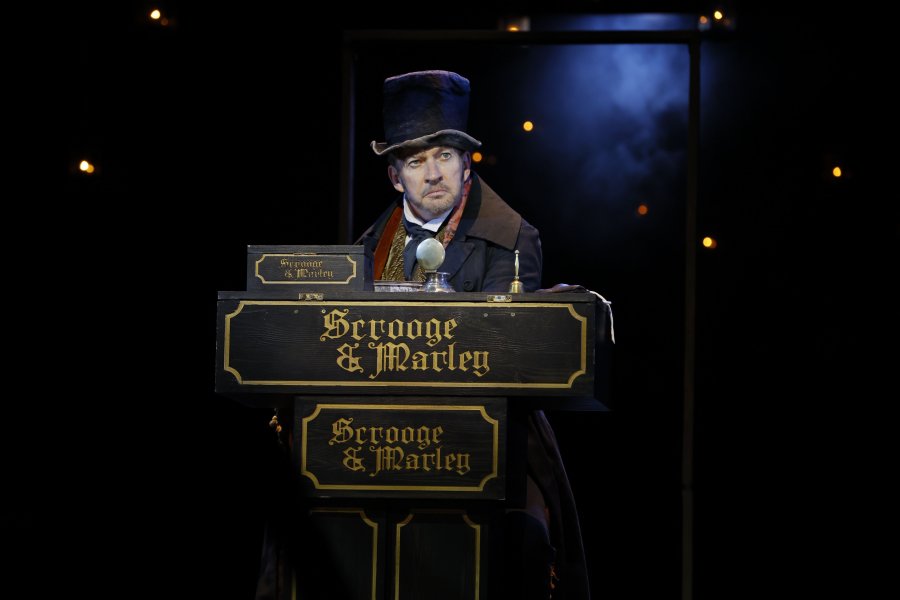By Jessica Taurins
The story of A Christmas Carol feels like one of the most adapted stories of all time. There are numerous movies – live action, animated, Muppet – as well as a plethora of stage productions every year, both amateur and professional. Yet still, regardless of its format, the core of the story remains the same: compassion and consideration for others is greater than all the money in the world. Even almost 200 years after its original conception, it can be difficult to conceive that the evils Charles Dickens experienced in his day can still be understood and seen in today’s world, but this is how the timeless tale of A Christmas Carol continues to ring true year after year.
The changes to the tale in its adaptation are vast in Jack Thorne’s version of the show. Thorne, known for writing Harry Potter and the Cursed Child in collaboration with Rowling, has brought a fantastic take to the show that brings Scrooge into a kinder light, even from the commencement of the show. Ebenezer Scrooge, as a global symbol of miserliness, is not particularly known as a sympathetic character. He is a single-minded grump, a selfish money-lender who believes he is doing the right thing in shutting down the small businesses of those who can’t repay their loans.
In Thorne’s version of the story, however, there are nuances that show how he came to be. Scrooge is shown to be abused by his father both physically and emotionally, and forced out of school to work instead, to bring home funds to the family. No matter what he does, it’s never enough for his father, who continues to beg for Scrooge’s money until the end of his days. Scrooge is still a heartless man in his old age, to be sure, but the ghosts of Christmas Past, Present, and Future, shine a bright lantern light upon the heartbreaking reality of difficult families and the barriers people must raise to survive.

With that, there could have been no more perfect casting for Ebenezer Scrooge than David Wenham. Wenham is a well-known stage and screen actor, and was an absolute delight to see onstage. He brought a level of magic to Scrooge’s every movement, from aggressively slamming his boxes of hoarded gold around the stage to reaching out to his past self with such compassion and pain it could be felt all the way to the back of the stalls. Wenham was a shining light in the entire cast and brought an incredible sense of emotion and reality to a character usually seen as pure evil.
Wenham was supported by a vast cast, all of whom played off him and each other to bring the tale to life. The three ghosts (Debra Lawrence as Christmas Past, Samantha Morley as Christmas Present, and Emily Nkomo as the dual role of Scrooge’s sister and Christmas Future), developed a warm rapport with Scrooge as he remembered his life, and learned of what would await him at the end of his days. Their astonishment at his emotional growth over just one night mirrored that of the audience, as well as our desire to see him start his life anew with the time he had left.

Of particular note in the remaining cast were that night’s Tiny Tim – Theo Watson-Bonnice – who brought a youthful joy to the stage in one of the story’s most memorable roles, as well as Bernard Curry as Scrooge’s long-suffering clerk Bob Cratchit. Curry’s Cratchit was sympathetic and loveable, and we could see in his actions why he continued to respect his master even throughout a lifetime of being treated so terribly.
Aside from the cast, the rest of the show itself had its own form of magic. The theatre was strung with lanterns which glimmered and glowed as the ghosts showed themselves to Scrooge across the night. Mystical snowfall fell across the stage and theatre during the show, bringing us all together in the frosty London winter. And, in a moment to not be spoiled, the preparation of a traditional Christmas dinner brought utter delight to the entire audience, with plenty of action happening both on and off the stage.
Natasha Fearnside, Lauren Jennings, and Lisa Reynolds performed the show’s soundtrack across multiple instruments, wonderfully bringing the compositions to life. Without their performances, not one moment of the story would have had the same impact or beauty, so they deserve immense praise for their work. Additionally, the inclusion of hand bell performances involving the entire cast brought a fantastic carolling tradition to life on the stage. The carols themselves throughout the show were used thoughtfully and enhanced the story, from deep and rumbling renditions to orchestral covers playing quietly below poignant scenes.

Even those who are Scrooge-ly themselves could find something to love about this adaptation of A Christmas Carol. The story is well-loved with its own new twists, allowing the cast to present a depth of character not seen in most regular performances of the show. The staging was magnificent, realistic with a touch of magic, and every element supported every other to bring the timeless story to life. Regardless of religion or belief, at all times of year it is so important to support one’s fellow humans, and A Christmas Carol is just one telling of a story where someone feeling love can change them for the better.
Images: Jeff Busby





